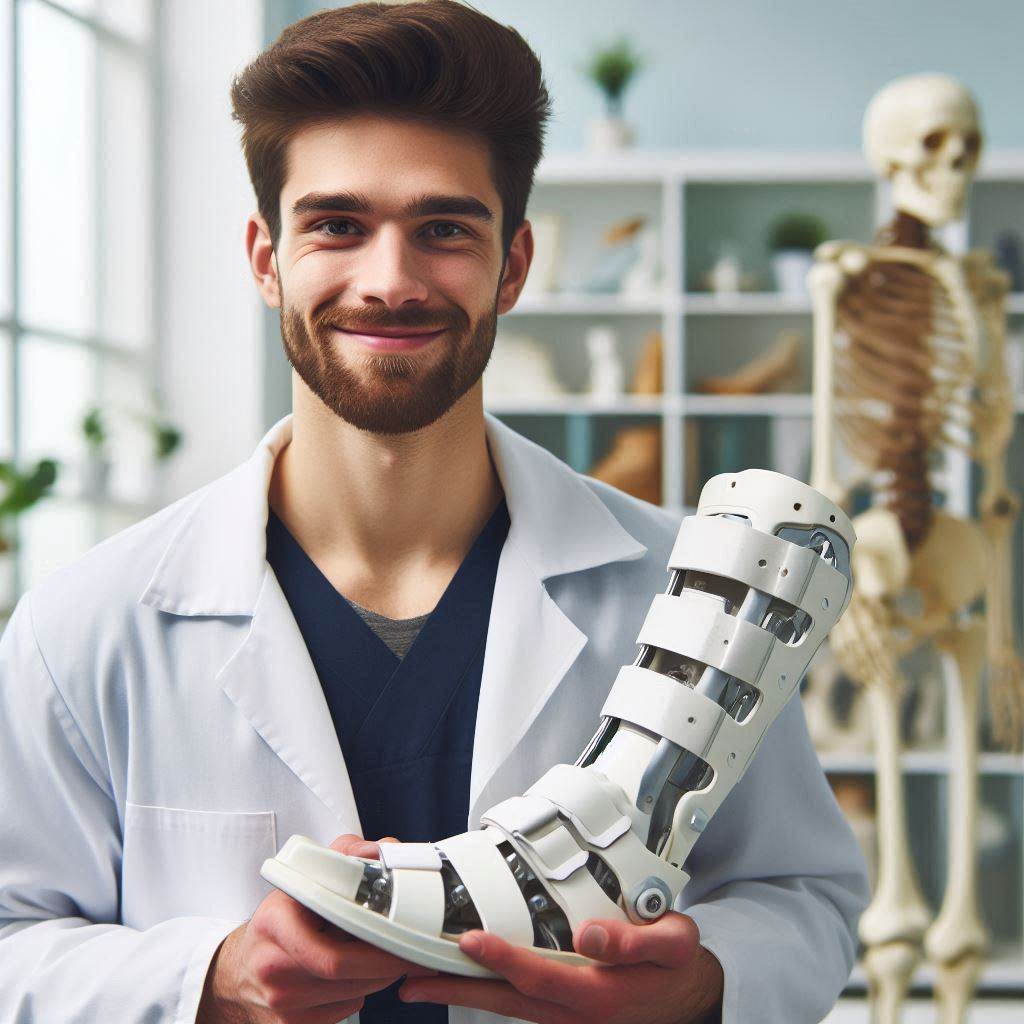Introduction
In this blog post, we will explore Aspiring Orthotists Prosthetists Educational Pathways.
In the healthcare field, orthotists/prosthetists play a crucial role in improving the quality of life for individuals.
Due to an aging population and advancements in technology, there is an increasing demand for professionals in this field.
This blog post aims to explore the various educational pathways available for individuals aspiring to become orthotists/prosthetists.
Aspiring orthotists/prosthetists typically start with a bachelor’s degree in fields such as biology, kinesiology, or engineering.
Coursework may include anatomy, physiology, biomechanics, and materials science to lay a solid foundation for their future practice.
After completing their undergraduate degree, individuals can pursue a master’s program specifically in orthotics and prosthetics.
These programs provide specialized training that covers assessment, design, and fitting of orthotic/prosthetic devices for patients.
Hands-on clinical experience is essential for aspiring orthotists/prosthetists to apply theoretical knowledge in real-world settings.
Internships and residencies offer opportunities to work under the supervision of experienced practitioners and gain practical skills.
Upon completing their education and training, individuals must obtain certification by passing exams administered by the American Board for Certification in Orthotics, Prosthetics & Pedorthics.
Obtaining state licensure is also required to practice as an orthotist/prosthetist in most states.
Overview of the role of orthotists/prosthetists
Orthotists and prosthetists are healthcare professionals who specialize in designing, fitting, and fabricating orthoses and prostheses for patients with physical disabilities.
They play a crucial role in improving the mobility and quality of life for individuals facing challenges due to limb loss, injury, or other conditions.
Responsibilities of orthotists/prosthetists in providing assistive devices to patients
Orthotists and prosthetists work closely with physicians, physical therapists, and other healthcare professionals to assess the needs of patients and create customized assistive devices.
They evaluate patients’ physical conditions, take measurements, design orthoses/prostheses, and ensure proper fitting and comfort.
Impact they have on improving quality of life for individuals with physical disabilities
The work of orthotists and prosthetists goes beyond providing physical support; it significantly impacts the emotional well-being and independence of individuals with disabilities.
By offering personalized solutions, they help patients regain mobility, engage in daily activities, and restore confidence in themselves.
Read: Orthotist vs Prosthetist: Key Differences Explained
Educational requirements
Academic background needed to pursue a career as an orthotist/prosthetist
- Academic background should include a strong foundation in science and anatomy.
- Obtaining a bachelor’s degree in biology, kinesiology, or a related field is highly recommended.
- Some programs may require prerequisite courses in math, physics, and chemistry.
- Graduate programs in orthotics and prosthetics typically require a bachelor’s degree for admission.
- Hands-on experience through internships or volunteer work can be beneficial in gaining practical skills.
Importance of obtaining a bachelor’s degree
- A bachelor’s degree provides a solid foundation in relevant subjects like anatomy and biomechanics.
- It demonstrates a commitment to the field and a willingness to invest in a comprehensive education.
- Advanced coursework in biology or kinesiology can better prepare you for the specialized training in orthotics/prosthetics.
- Many employers prefer candidates with a bachelor’s degree for entry-level positions in orthotics and prosthetics.
- Graduate programs in orthotics/prosthetics typically require a bachelor’s degree as a prerequisite for admission.
Specialized training programs
When pursuing a career as an orthotist/prosthetist, it is essential to explore the various certification programs available.
Transform Your Career Today
Unlock a personalized career strategy that drives real results. Get tailored advice and a roadmap designed just for you.
Start NowThese programs provide the necessary education and training to become certified professionals in the field.
Certification programs
One of the most well-known certification programs is offered by the American Board for Certification in Orthotics and Prosthetics (ABC).
ABC offers two certification pathways: Orthotist and Prosthetist, each requiring completion of specific coursework and clinical hours.
Another reputable organization that offers certification is the Board of Certification/Accreditation (BOC).
BOC provides certification for Orthotist, Prosthetist, and Orthotic Fitter, with rigorous requirements for completion.
Hands-on experience and clinical training
Aside from coursework, aspiring orthotists/prosthetists must complete a certain number of clinical hours to gain hands-on experience.
This clinical training is essential for developing practical skills and understanding the real-world applications of orthotics and prosthetics.
Under the supervision of experienced professionals, students learn how to assess patients, design custom devices, and provide ongoing care.
Hands-on experience also includes working with various materials, tools, and technologies used in the field of orthotics and prosthetics.
Through clinical training, students have the opportunity to work directly with patients and make a difference in their quality of life.
Overall, specialized training programs provide aspiring orthotists/prosthetists with the knowledge, skills, and experience needed to succeed in this rewarding career field.
Read: Public Health Administrator Career Advancement Tips
Internship opportunities
In the field of orthotics/prosthetics, completing internships can be a crucial step in your educational pathway.
Significance of Internships
- Internships offer hands-on experience in orthotics/prosthetics clinics.
- Working with patients under supervision provides valuable real-world skills.
- Internships allow you to apply theoretical knowledge in practical settings.
- Working alongside experienced professionals offers mentorship and guidance.
- Internships help students understand the day-to-day responsibilities of orthotists/prosthetists.
Benefits of Internships
- Gain practical skills that cannot be learned in a classroom setting.
- Build professional relationships with industry experts and potential employers.
- Enhance problem-solving and critical thinking skills through hands-on experience.
- Develop confidence in working with patients and assessing their orthotic/prosthetic needs.
- Internships provide a platform to showcase your abilities and work ethic to future employers.
Overall, completing internships in orthotics/prosthetics clinics can significantly enhance your educational journey and prepare you for a successful career in this specialized field.
Read: Orthotist/Prosthetist vs. Other Allied Health Professions

Learn More: Health Information Technician Job Satisfaction
Licensing and Certification
Requirements for Obtaining a License
- Completion of an accredited orthotics/prosthetics program
- Passing the National Commission on Orthotic and Prosthetic Education (NCOPE) exam
- Fulfillment of state-specific licensing requirements
- Clinical residency or internship may be necessary
Importance of Obtaining Certification
- Validates expertise in the field of orthotics/prosthetics
- Demonstrates commitment to professional excellence
- Enhances credibility with employers and patients
- Provides opportunities for career advancement
Professional Organizations
- American Board for Certification in Orthotics, Prosthetics & Pedorthics (ABC)
- Board of Certification/Accreditation (BOC)
- National Commission on Orthotic and Prosthetic Education (NCOPE)
- Orthotic Prosthetic Certification Board (OPCB)
Read: How to Become an Orthotist/Prosthetist: A Step-by-Step Guide
See Related Content: Medical Transcriptionist Job Outlook 2024
Career prospects and advancement opportunities
Job opportunities
Orthotists/prosthetists can work in hospitals, rehabilitation centers, and private practices.
Showcase Your Business Today
Reach thousands of readers actively exploring professional services. Publish your business profile and grow your audience now.
Publish NowPrivate practices can offer more autonomy and flexibility in patient care.
In hospitals, orthotists/prosthetists may work closely with medical teams to provide comprehensive care.
Rehabilitation centers focus on helping patients regain mobility and independence after injury or illness.
Orthotists/prosthetists may also work in research institutions to develop innovative designs for devices.
Specialization opportunities
Orthotists/prosthetists can specialize in pediatric orthotics/prosthetics to work with children.
Specializing in sports medicine allows orthotists/prosthetists to work with athletes.
Other areas of specialization include geriatrics, trauma, spinal injuries, and neurology.
By specializing, orthotists/prosthetists can develop expertise in specific patient populations or conditions.
Specialization can lead to increased job satisfaction and opportunities for professional growth.
Overall, the field of orthotics and prosthetics offers a range of career opportunities and pathways for growth and advancement.
Whether working in hospitals, rehabilitation centers, private practices, or specializing in specific areas such as pediatric orthotics/prosthetics or sports medicine, orthotists/prosthetists play a crucial role in helping individuals regain mobility and independence.
The potential for career development and specialization in this field allows professionals to tailor their practice to their interests and skills, leading to a rewarding and fulfilling career in orthotics and prosthetics.
Explore Further: Continuing Education for Clinical Social Workers
Conclusion
Aspiring orthotists/prosthetists have several educational pathways to choose from, including earning a bachelor’s degree in a related field, pursuing a master’s degree in orthotics/prosthetics, or completing a certificate program.
It is essential for individuals interested in this field to gain hands-on experience through internships or clinical rotations to enhance their skills and knowledge.
After completing their educational requirements, orthotists/prosthetists can seek certification through the American Board for Certification in Orthotics, Prosthetics & Pedorthics to demonstrate their expertise.
By considering a career in orthotics/prosthetics, individuals have the opportunity to make a positive impact on the lives of individuals with physical disabilities, helping them regain mobility and independence.
Overall, pursuing a career in orthotics/prosthetics requires dedication, hard work, and a passion for helping others.
By choosing the right educational pathway and obtaining the necessary training, individuals can succeed in this rewarding and fulfilling field.
[E-Books for Sale]
The Big Book of 500 High-Paying Jobs in America: Unlock Your Earning Potential
$19.99 • 500 High-Paying Jobs • 330 pages
Explore 500 high-paying jobs in America and learn how to boost your career, earn more, and achieve success!
See All 500 High-Paying Jobs of this E-Book
1001 Professions Without a Degree: High-Paying American Jobs You Can Start Now
$19.99 • 1001 Professions Without a Degree • 174 pages
Discover 1001 high-paying jobs without a degree! Unlock career tips, skills, and success strategies for just $19.99!




